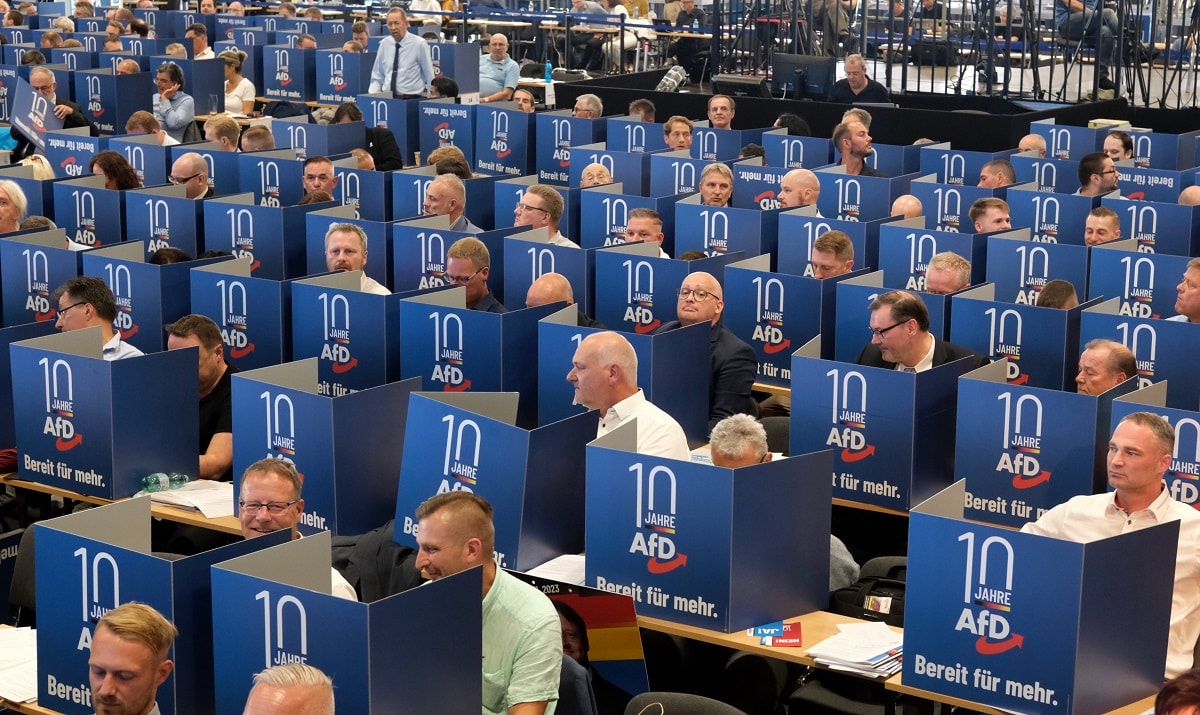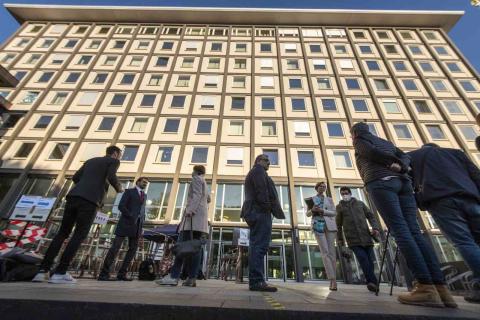To view it charitably, one might have forgiven Friedrich Merz for a brief lapse of judgment. But to view it critically, the comment last month by Germany’s centre-right Christian Democratic Union (CDU) leader confirmed a worrying pattern. Speaking at an event in Bavaria, Merz described his party – in opposition since the elections of September 2021 – as an “Alternative for Germany with substance”.
The reference was to the far-right Alternative for Germany (AfD) party, which has recently enjoyed a drastic surge in the opinion polls and a handful of local electoral victories. Merz’s comment seemed to suggest – somewhat bafflingly – that he has taken the AfD as the benchmark of democratic opposition. Even more intriguing, however, was the way the comment revealed just how deeply the AfD has eaten its way into the brain of the conservative mainstream.
For Merz’s CDU, the question of how to deal with an empowered extreme right is an existential one. Four clear tactics have presented themselves: ignore, attack, imitate, or cooperate. At various junctures over the past six years or so, the CDU has experimented with the first three – but not, so far, the last. If “ignore” was the modus operandi of Angela Merkel during the twilight years of her chancellorship, “attack” remains the default – even if it risks normalising the AfD as a political opponent. “Imitation” is – even notwithstanding principles (!) – the quickest and surest route to electoral self-annihilation. In 2018, the CDU’s Bavarian sister party, the Christian Social Union (CSU), lost its absolute majority in the Bavarian parliament after a campaign marked by AfD-style rhetoric on refugees and immigrants. Markus Söder, the CSU leader, later repented for the strategy and labelled it a “serious mistake”.
Whatever the catch, all three of these options are predicated on upholding what is routinely referred to as the “firewall” (Brandmauer) between the Union and the far-right extremes. But last week, in yet another unguarded moment, Merz triggered a fresh wave of anger within his own party when he seemed to suggest that the time had arrived to experiment with the fourth, untested possibility – cooperation. Merz rowed back from the idea almost immediately, but the mere suggestion that the CDU might begin to pull some bricks out of the firewall proved incendiary. Kai Wegner, Berlin’s mayor, tweeted that his party “cannot and will not cooperate with a party whose business model is hatred, division, and exclusion”. Boris Rhein, the premier of the state of Hesse, which faces elections in October, reminded his colleagues that “these people have nothing to do with Christian Democratic values”.

There are some universal dimensions to the dilemma that Merz faces. Conservatives everywhere are confronted with the challenge of preserving their mainstream appeal while at the same time ensuring that the right wing remains in their camp. Collaboration in government has indeed been tested in Austria, Finland and Sweden. But the sudden disappearance of the old post-war centre-right parties in Italy and France traumatises the CDU. So, too, does the capitulation of conservatives in the United Kingdom and United States to right-wing demagogy.
Nonetheless, it is arguably the German specifics of Merz’s problem that render it so tricky to navigate: the heavy historical legacy of right-wing extremism, the proudly federalist structure of its constitution, the consensus-and-compromise reflex of its politics, and the East-West divide that continues to shape the country’s political map.
It is the latter factor that generates the severest political headaches. In many of the regions that until 1990 belonged to the German Democratic Republic, the AfD is by far the most popular party. Three states in the former East – Brandenburg, Saxony and Thuringia – will have elections in September 2024, and it is possible that the AfD will emerge as the largest party in each. Recognising the impossibility of simply ignoring the AfD in these regions, Saxony’s CDU Premier Michael Kretschmer has called for a “pragmatic approach” at the local level. For CDU figures in the western parts of the country, by contrast, there is nothing to be gained – but a great deal to be lost – in reaching out to the far right.
To look at the panic engulfing the CDU right now, one could be forgiven for forgetting that the party has been by far the most popular in the country for some 18 months, and on polling figures alone is best placed to recoup the chancellorship at the next national election, due around October 2025. Given the fractiousness of the governing Social Democratic-Green-Liberal coalition, the Union opposition should, in theory, be brimming with confidence. However, in place of the deep breath that the long summer pause should provide, the CDU has revealed itself to be suffocating under an ongoing internal battle over its future political direction – and the capacity of Merz to provide it.
The CDU’s AfD question would no doubt look more resolvable if it weren’t for the many reservations around Merz himself. Internally, he is divisive; externally, he is disliked. What is more, Hendrik Wüst, the popular Premier of North Rhine-Westphalia, Germany’s most populous federal state, has begun to position himself within the party as the anti-Merz candidate. Should the sharks continue to circle, and should Merz continue to commit unforced errors, the situation in Germany’s conservative camp could become very rancorous indeed – in which case, one might only expect the party’s compulsive obsession with the far right to reach new heights. Needless to say, all of this would only be to the advantage of the AfD.

